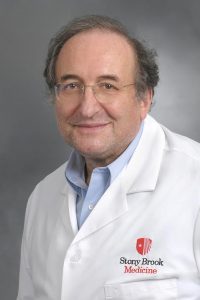By Daniel Dunaief
Screening for cancer can help people take steps to head off the development of a disease that could threaten the quantity and quality of their lives.
During the start of the pandemic, people around the world stopped screening for cervical, breast and colorectal cancer, according to a recent study led by Paolo Boffetta, Associate Director for Population Sciences at Stony Brook University’s Cancer Center.
The results of the study were recently published in the journal JAMA Oncology.
Compared to 2019, screenings for breast cancer dropped in the first few months after the start of the pandemic by 35.6 percent for breast cancer, 41.8 percent for colorectal cancer, and 54.1 percent for cervical cancer compared to the same period in 2019.

Boffetta chose these three cancers because they are the ones public health authorities recommend for the population at large. Screenings can improve patient outcomes.
“For some/ most cancer, the earlier the better for detection,” explained Stony Brook Cancer Center Director Yusuf Hannun.
Boffetta, who is also Adjunct Professor at the Icahn School of Medicine at Mount Sinai in New York City, suggested that the longer-term impact of a reduction in screenings in the early part of the pandemic won’t be clear to doctors or patients in the short term.
“It will take a little bit of time to have a full understanding of this,” said Boffetta. Depending on the specific type, cancers “that are detected by screenings would not otherwise appear for a few years.”
Boffetta suggested that the pandemic, apart from the illnesses and symptoms that threatened the health of people who were battling the virus itself, affected public health services. He believes several factors likely contributed to the decrease in screenings. Patients around the world were reluctant or restricted in their ability to leave their homes amid lockdowns.
Additionally, some cancer centers likely reduce the number of people they monitored to cut back on the density of patients in health care facilities, although Boffetta did not gather any data on the reduction in the number of screenings at health care centers.
The positive news amid this study, which surveyed cancer screening data in PubMed and other medical journals from 19 countries from January 2020 through December 2021, was that the number of patients screened returned to a more normal level within several months of the start of the pandemic.
“An important finding is that by the summer of 2020, the decrease in screenings for breast cancer and cervical cancer seem to have disappeared,” Boffetta said by phone from Italy, where he is a part-time professor at the University of Bologna. “For colorectal cancer [the decrease in screenings] lasted longer,” through the end of 2020.
Boffetta described the reduction in screenings and then a return to normal as a U-shaped curve, with an initial decline followed by a recovery. Doctors typically screen for colorectal cancers by using a colonoscopy. This technique requires several hours in the hospital. Patients may have been “more reluctant to go back to such a complex procedure, compared to the mammography or pap smear” which screen for breast and cervical cancers, respectively.
Boffetta is conducting a broad study of the cancer literature from early findings to clinical diagnosis to treatment. At this point, he has finished a paper on the frequency and types of clinical diagnoses amid the pandemic. He is collecting data for another study that will examine cancer treatment.
“We are interested in how the pandemic affected each of these stages,” he said.
Hannun suggested that Boffetta’s work expertise help address important health care questions related to the pandemic and other threats to public health, adding, “Epidemiology is essential for understanding the pandemic and many chronic diseases, especially cancer with exposure issues.
A lab update
Boffetta joined Stony Brook University in April of 2020, soon after the start of the pandemic.
Also a Professor in the Department of Family, Population and Preventive medicine at the Renaissance School of Medicine at Stony Brook University, Boffetta will return to the United States in a few weeks from Italy.
Boffetta has added Research Coordinator Germana Giupponi and postdoctoral fellow Malak Khalifeh to his research efforts at Stony Brook.

A native of Italy, Giupponi, who started working with Boffetta in July of 2020 and provides administrative support and coordination with Boffetta’s collaborators, earned her master’s degree from the University of Milan.
Khalifeh joined Boffetta’s lab in March, is originally from Lebanon and conducted her PhD research in France at the University of Bordeaux. She is studying the link between the exposure people have to various chemicals in drinking water and bladder cancer. The bladder is especially susceptible to toxins from the environment.
Boffetta, meanwhile, has started teaching some graduate level classes at Stony Brook on cancer epidemiology for master’s and PhD students. He will teach one class this fall.
He is also continuing his studies with survivors of the World Trade Center attacks.
He has been comparing the survival of these first responders to the overall population in New York, comparing how the risk of cancer changed over the course of the 21 years since the attacks.
Boffetta has been working with Ben Luft, Director of the Stony Brook WTC Wellness Program at the Renaissance School of Medicine. Luft has provided clinical and research support for WTC responders.
Boffetta continues to have academic affiliations with other academic institutions, including Harvard University and Vanderbilt University.
Boffetta and his wife Antonella Greco, who have been living in New York City, plan to move to the Stony Brook area. Their three daughters live in Brooklyn, Italy and Argentina. Now that pandemic restrictions have lifted, Boffetta has been able to return to the opera and museums and has done some skiing and hiking.
As for this study, Boffetta suggested that the findings about screenings were consistent with what he might have expected during the beginning of the pandemic.Delaying screenings could mean that some people discover cancers at a more advanced state by the time they diagnose them, he said.





